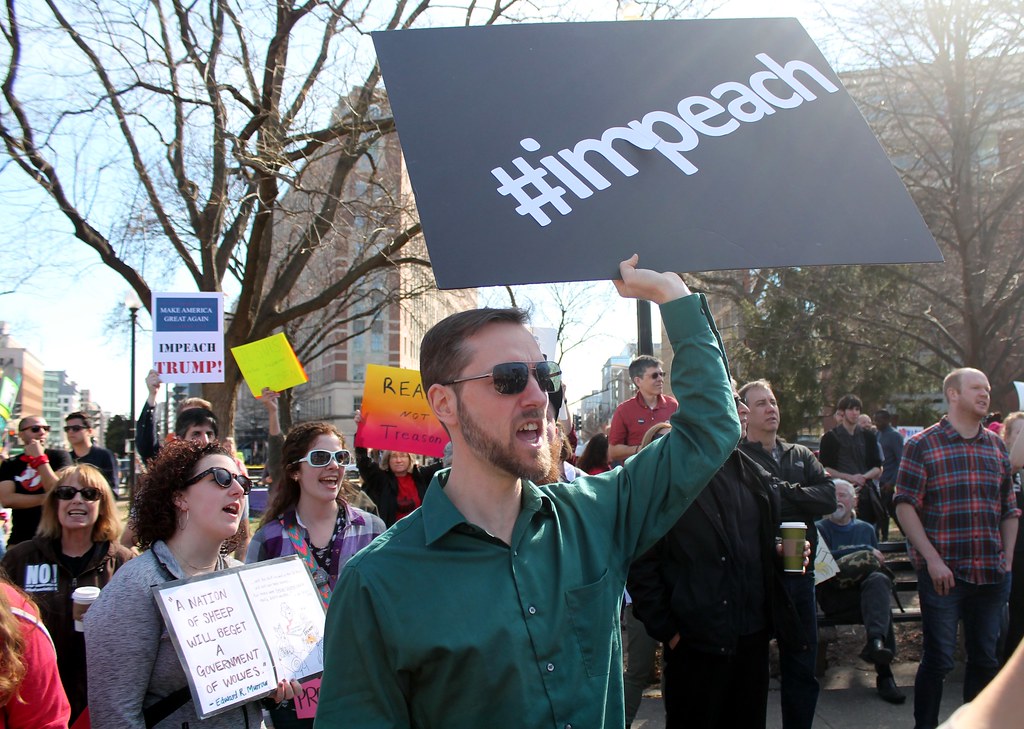What If the House Held Impeachment Proceedings and Nobody Noticed?
Is the country in the midst of an impeachment process or not?

Published by The Lawfare Institute
in Cooperation With

Is the country in the midst of an impeachment process or not?
The answer should be simple. But congressional Democrats have muddled through subpoenas and hearings and press conferences for more than three months since Robert Mueller delivered his report, without adding much clarity. On Aug. 8, House Judiciary Committee Chairman Jerry Nadler tried to change that. Responding to CNN’s Erin Burnett, he declared forcefully that his committee’s current program “is formal impeachment proceedings.” Later the same night, with Rachel Maddow on MSNBC, he said, “We’ve made it clear that the committee is holding an investigation.… [W]e are considering what to do about it, including the possible voting of articles of impeachment.”
The nation barely noticed. Between a string of mass shootings, the ongoing Democratic presidential primary and a shuffle of senior intelligence leaders, even political junkies seemed to take little notice of the news that the House of Representatives has begun officially and publicly moving forward with investigations to invoke its solemn, constitutionally ordained “sole power” to impeach the president for “Treason, Bribery, or other high Crimes and Misdemeanors.” In the age of Trump, it seems, not even the beginning of impeachment proceedings offers a national moral inflection point.
Part of the confusion, though, is that Democrats seem to have deliberately avoided the dramatic moment that a whole-House vote to authorize a formal impeachment inquiry would provide. Perhaps House Democrats fear Trump would hijack any such moment to paint Democrats as both extreme and feckless. Perhaps they fear that initiating impeachment proceedings, rather than simply conducting them without formally invoking an impeachment process, would crowd out the ability to move forward on other legislation. Perhaps they have backed into impeachment “proceedings” as a compromise among different views about impeachment within their caucus; Speaker of the House Nancy Pelosi certainly wants to protect her majority by shielding red-state Democrats from a vote that she apparently does not think would help them retain their seats in November 2020.
Perhaps House Democrats only need to strengthen their hand in their lawsuit seeking access to Mueller’s grand jury material, which formal impeachment proceedings may help them achieve. In May, one of us analyzed, with Molly Reynolds, what powers formal impeachment action would give the House. Although uncertain, it’s more likely than not that benefits would accrue to House investigators battling an intransigent White House if investigators were to seek documents and testimony under impeachment proceedings, rather than under traditional oversight. This is particularly true for the Judiciary Committee’s effort to obtain grand jury materials from Mueller’s investigation, which are protected by statute from disclosure in most circumstances. Announcing that formal proceedings are underway will be ammunition in the related coming courtroom battles, including efforts to compel former White House counsel Don McGahn’s testimony. It could be, then, that Pelosi is leading a strategy not of drift but of calculation, as an attempt to maximize the litigation benefits of something impeachment-ish while minimizing the associated political cost.
Or perhaps Pelosi simply doesn’t have the necessary votes to begin an impeachment inquiry; right now there are only 118 Democrats that have expressed public support for an inquiry, well short of the 218 votes needed to overcome opposition from Republicans.
The answer is probably “all of the above.” Whatever the mix of reasons, the result has been month after month of confusing, seemingly contradictory statements from Democratic leaders about what this process is and isn’t. How the country arrived at Nadler’s confirmation of “formal impeachment proceedings” was an incremental process—so one can be forgiven for having missed it.
On April 18, the day Congress and the public received the Mueller report, Democrats were relatively united in communicating that they were not headed toward impeachment. House Majority Leader Steny Hoyer told CNN, “Based on what we have seen to date, going forward on impeachment is not worthwhile at this point.... Very frankly, there is an election in 18 months and the American people will make a judgment.”
As of May 15, Nadler seemed convinced the committee was probably not headed toward impeachment. In an interview with CNBC’s John Harwood, the two had this exchange:
HARWOOD: When you say, “The question of impeachment is down the road,” do you have a clock in your head? Does it need to be this calendar year or not at all?
NADLER: I don’t mean just in terms of time. It depends what comes out. It depends where the American people are, whether they want to go that way or not. I don’t want to make it sound as if we’re heading for impeachment. Probably we’re not.
HARWOOD: You really believe that? Probably we’re not?
NADLER: Probably, but I don’t know.
HARWOOD: What I hear from your colleagues is the reverse — probably we are, but not yet.
NADLER: Maybe. It’s hard. I don’t know.
But then things began to change—slowly and subtly at first. In a July 11 memorandum to the members of the Judiciary Committee addressing Mueller’s upcoming testimony, Nadler wrote that “articles of impeachment have already been introduced in this Congress and referred to the Judiciary Committee. They are under consideration as part of the Committee’s investigation, although no final determination has been made. In addition, the Committee has the authority to recommend its own articles of impeachment for consideration by the full House of Representatives.” As part of the investigation, “[t]he committee seeks key documentary evidence and intends to conduct hearings with [former White House Counsel Don] McGahn and other critical witnesses testifying to determine whether the committee should recommend articles of impeachment against the President or any other Article I remedies, and if so, in what form.”
That’s not quite “impeachment is not worthwhile at this point” or “I don’t want to make it sound as if we’re heading for impeachment. Probably we’re not.”
Then, in her July 24 press conference following Mueller’s testimony before the Judiciary and Intelligence Committees, Pelosi did not call for impeachment but indicated she thought that “[t]he American people now realize more fully the crimes that were committed against our Constitution.... It is a crossing of a threshold in terms of the public awareness of what happened.” Nadler also spoke but did not use the word “impeachment” in his remarks either.
Two days later, however, in a July 26 press conference addressing the committee’s application with the U.S. District Court for the District of Columbia requesting the release of grand jury material redacted from the Mueller report, along with additional related grand jury material, Nadler said that “[b]ecause Department of Justice policies will not allow prosecution of the sitting president, the United States House of Representatives is the only institution of the federal government that can now vote President Trump accountable for these actions,” and that the committee has already “in effect” been conducting an impeachment investigation against the president. The July 26 filing referenced Nadler’s language in the earlier July 11 memo described above.
Pelosi then released a statement on Aug. 2 reiterating her calls for litigation, investigation and legislation—but not impeachment. But in its Aug. 7 filing to compel testimony from McGahn, Nadler’s committee describes what it is doing this way:
The Judiciary Committee is conducting an investigation to understand the scope and extent of misconduct by President Trump, and that investigation includes consideration of whether the Judiciary Committee should exercise its Article I powers to recommend articles of impeachment. Articles of impeachment have already been introduced and referred to the Judiciary Committee in this Congress. To fulfill its duties, the Judiciary Committee must obtain testimony and evidence from witnesses to the president’s actions to determine whether to recommend such articles against the President, or whether to recommend additional or alternative articles that the Judiciary Committee may prepare.
All that brings us to Nadler’s “formal impeachment proceedings” line, along with his statement that he anticipated a decision on whether to vote on articles of impeachment before the end of this year. In this light, it’s no surprise that what might have been headline news was instead met with relative indifference. It arrived gradually over weeks of mission creep.
But the absence of drama following Nadler’s declaration also reveals something about the primary political argument against impeachment—as well as an uncomfortable truth about how Trump has already changed the way Americans react to persistent violations of established norms of presidential behavior.
On the political side, the main reason offered by Pelosi and political pundits alike for not pursuing impeachment efforts has been the belief that initiating such formal proceedings without a clear path to conviction and removal by the Senate would damage Democrats at the polls in 2020. This line of argument, at a minimum, seems at odds with the lessons from the elections after the country’s two presidential impeachments, neither of which removed the commander in chief. In 1868, Republicans in the House successfully impeached President Andrew Johnson but the Senate did not convict him. After that fall’s elections, Republican Party control remained the same in the Senate, Democrats gained seats in the House but Republicans kept their overwhelming majority, and the presidency went to a Republican, Ulysses Grant. Similarly, the Republican Party suffered little at the polls after the House’s late 1998 impeachment of President Bill Clinton—on lesser charges than those in public view against Trump now—ended in acquittal by the Senate in February 1999. After the congressional elections in 2000, the Senate moved from Republican control to a tie, but Republicans lost only one seat in the House and won the presidency when George W. Bush took office.
Nevertheless, through the spring and even after the Mueller report’s release, polls showed no majority in favor of impeachment, suggesting to Pelosi and others that moving forward on formal investigations of the president with a mind to that constitutional remedy would bring a backlash from the public. But contrary to this line of thinking, Nadler’s clear statement that we are actually in the midst of formal impeachment proceedings has prompted more indifference than public revulsion. Nadler’s announcement may thus represent the erosion of the political argument against impeachment, as Democrats slowly, almost quietly, emphasize the value of having every advantage in hand before going to judges to gain the materials needed to paint the full picture of presidential wrongdoing.
Nadler’s statement is also an undefined but palpable admission that Trump’s persistent attacks on norms, which have desensitized Americans to each subsequent outrage, demand a different approach to removing a president. Before 2016, and perhaps even until the release of the Mueller report, it might have seemed that if a president were to cross some undefined threshold, outrage would demand impeachment proceedings as the next logical step.
Trump, however, has presided over a change in the political culture. The country has a president who commits one heinous deed after another, says one outrageous thing after another, and so habitually and consistently violates the country’s sense of appropriate presidential behavior that each successive offense gets a lesser reaction. Actions that would have brought previous presidents widespread opprobrium now pass by every few days with little more than collective shrugs from politicians and pundits. There’s no one moment at which it seemed that this particular act clearly crossed the line between unproductive but grudgingly acceptable behavior and undeniably impeachable activity. Each new misdeed has prompted a slightly smaller, notably less effective response.
In such an environment, it would be understandable for the speaker of the House to avoid a dramatic declaration to the American people that some particular new outrage changes the ballgame and demands impeachment proceedings. That moment could have been Comey’s firing in May 2017. The release of the Mueller report could have been another such time, except that so much of its content had already been revealed by reporting that the offenses described therein were already priced into presidential approval numbers.
Instead, Congress’s slowly backing into impeachment proceedings reflects the public’s desensitization to presidential unfitness. The House has kind of been undertaking the impeachment process for months, sort of investigating it here and there, such that a statement that “this is formal impeachment proceedings” spurs only yawns.
To paraphrase Donald Rumsfeld: In a Trumpian world, you go into impeachment proceedings with the momentum you have, not the momentum you might want.





